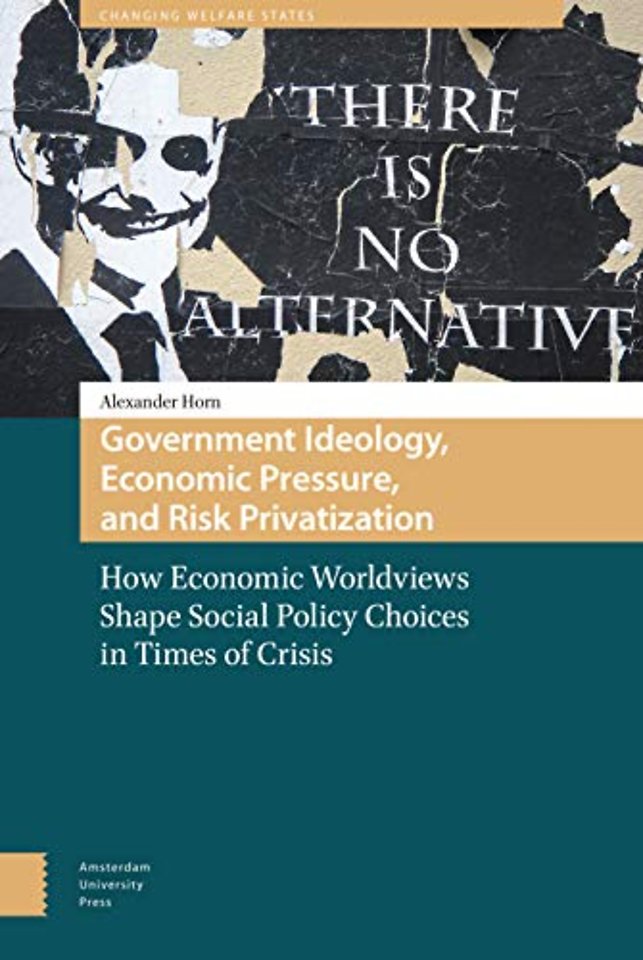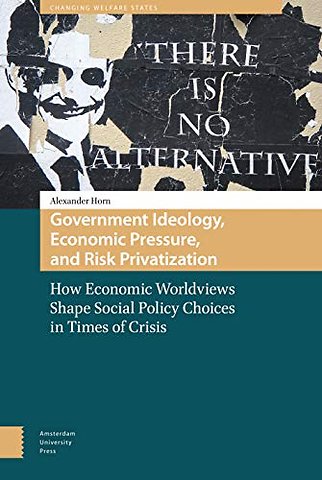Government ideology, economic pressure, and risk privatization
How economic worldviews shape social policy choices in times of crisis
Paperback Engels 2017 1e druk 9789462980204Samenvatting
From the 1980s on, a privatization of labour market-related risks has occurred in the OECD. Governments have cut the generosity of social programs and tightened eligibility rules, particularly for the unemployed. The book analyses these curtailments for eighteen countries over the course of four decades and provides an encompassing comparative assessment of the interactive impact of government ideology and economic pressure.
It demonstrates that the economic worldviews of governments are the most important factor in explaining why cuts are implemented or not. While ideas of non-intervention in the market underlie cuts in generosity, ideas of equality and fairness are at the heart of stricter eligibility criteria. The book also shows that the impact of the economic pressures often held responsible for the marginalization of politics and government ideology is in fact conditional on the specific ideological configuration.
Specificaties
Lezersrecensies
Inhoudsopgave
1 Risk Privatization, Economic Crisis, and the Primacy of Politics 11
1.1 Context, Research Problem, and Research Question 11
1.2 The Independent Variable Problem 16
1.3 Addressing the Independent Variable Problem in the Study of Partisan Effects 22
1.4 Way of Preceding and Outline of the Results 25
2 Much Ado about Nothing? Retrenchment versus Resilience 31
2.1 What Is Retrenchment? Searching for a Definition 31
2.2 How to Measure Retrenchment? 34
2.3 Developments and Patterns in OECD Countries 43
2.4 When Is Change Significant? Retrenchment and Its Consequences 52
2.5 Conclusion 56
3 Theoretical and Analytical Framework: What We (Do Not) Know 59
3.1 Three Perspectives on Government Ideology and Retrenchment 60
3.2 State of Research: Inconclusive Evidence, Desiderata, and Problems 78
4 Theoretical and Analytical Framework: Taking Ideology Seriously 95
4.1 The “Independent Variable Problem” in Comparative Welfare Research 96
4.2 Addressing the Problem: Ideology as Cognitive Frame/ Belief System 116
5 The “End of Ideology?” Government Ideology over Time 141
5.1 The Debate on Ideological Change and Ideological Convergence 141
5.2 Developments and Patterns: Partial Ideological Convergence 144
6 The Ideological Complexion of Government and Retrenchment 151
6.1 Research Design: Case Selection, Data, and Model Specification151
6.2 Group-Interest Explanations versus the General Framing Argument 163
6.3 Testing Robustness, Alternative and Complementary Explanations 178
6.4 Specific Framing Argument: Ideology Moderates Economic Pressure 196
6.5 Crisis, Ideology, and Retrenchment in Germany, the United Kingdom, and Sweden 205
6.6 Summary Regarding the Hypotheses: Why Ideology Still Matters 238
7 Ideology Still Matters: Findings, Limitations, and Implications 243
7.1 Summary and Findings 243
7.2 Implications for the “Old” versus “New” Politics Debate 246
7.3 The Contribution(s) of the Study 247
7.4 Limitations of the Study and Avenues for Future Research 248
7.5 Implications for Representative Democracy and the
Welfare State Debate 250
Annex 255
Annex 1 Right-Left (RILE) Position of Parties over Time 255
Annex 2 Correlation Matrix Left Items of the RILE 256
Annex 3 Correlation Matrix Right Items of the RILE 258
Annex 4 Right-Left over Time in Eighteen OECD Countries 260
Annex 5 Welfare Ideology over Time in Eighteen OECD
Countries 260
Annex 6 Market Ideology over Time in Eighteen OECD
Countries 261
Annex 7 Item Description Welfare and Market Ideology 262
Annex 8 Effects of Ideology on Generosity and Conditionality
in POLS, FE, FE Robust, FEVD 263
Annex 9 Union Density over Time in Eighteen OECD
Countries 264
References 265
Index 283
Anderen die dit boek kochten, kochten ook
Rubrieken
- advisering
- algemeen management
- coaching en trainen
- communicatie en media
- economie
- financieel management
- inkoop en logistiek
- internet en social media
- it-management / ict
- juridisch
- leiderschap
- marketing
- mens en maatschappij
- non-profit
- ondernemen
- organisatiekunde
- personal finance
- personeelsmanagement
- persoonlijke effectiviteit
- projectmanagement
- psychologie
- reclame en verkoop
- strategisch management
- verandermanagement
- werk en loopbaan







